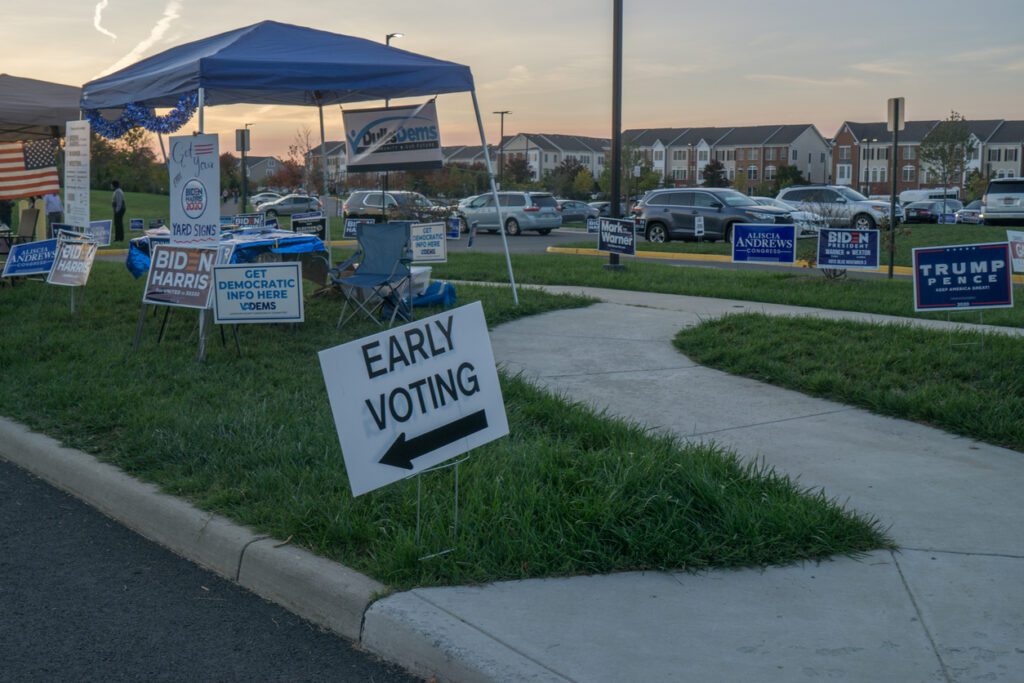How Digital Can Help Thread the Needle in Virginia
Voters may be up for grabs in unexpected places this year in Virginia, which means reaching a larger slice of the potential target universe could pay dividends.


Early voting starts in six weeks in Virginia, and both political parties have reason to worry.
Voters gave Joe Biden a 10-point win there just nine months ago, but Virginia’s off-off-year elections usually go against an incumbent president’s party. Democrats run the state today, but polls in the governor’s race show a tight margin, and memories of 2009’s Republican victories can’t help but surface in the minds of local campaigners.
Another thing taking the wind out of Democratic sails? Exhaustion. Left-leaning activists and volunteers are coming off of four years or more of organizing against Donald Trump, and of fretting about what might happen if they failed. Democratic campaigns are already having a harder time finding volunteers than in recent years, and many of the voters they need may find reasons of their own to take a breather on Election Day.
Republicans can’t rest easy, though. Trump voters went to the polls in larger numbers nationwide than predicted last year, denying Biden wins his team expected and keeping Democrats’ congressional margins thin as a slice of Virginia ham. With political lines only hardening since the election and the January 6th insurrection, many Trump enthusiasts will surely be motivated to stay involved in the process, even if only to beat the libs.
But Trump voters didn’t turn out bigly enough to win Virginia in 2017 or 2019, and we have no guarantee that this year will be different. Plus, Biden’s a tough opponent for a movement built on outrage. Being as reassuringly banal as Joe makes you hard to meme or demonize, and relatively few Republican hits on the cultural front have managed to land so far.
In any case, the messages most likely to appeal to the former president’s base are also highly likely to turn off other Virginia voters who might be on the fence. For instance, think of suburban women repelled by Trump but who might consider voting Republican in other circumstances. They probably won’t love the more-extreme messaging that fills conservative media and raises money from the base, making careful digital targeting even more important than usual.
Campaigns on both sides will have help on the messaging front from a slew of outside players, including party organizations like the RGA, DGA, RLCC and DLCC. Independent groups will span the gamut, and while some apparently exist mainly to spend money on TV ads, others will help campaigns with everything from virtual phone banking to digital fundraising. Since Virginia is the only prominent political game in play this November, devoted activists will send letters, make calls and deploy their credit cards from across the country — all they need is a button to push.
Despite the help, most down-ballot campaigns still won’t be flush enough with cash to spend enough to flood the zone with messaging. They’ll have to allocate resources carefully, and again, digital tools can provide the means. If in-person volunteers are harder to find, campaigns can turn to peer-to-peer texting to get more value out of each hour a person spends. Relational apps that encourage friend-to-friend outreach to priority voters should make the process even more efficient, since texts or a phone call from someone a voter knows should cut through the campaign-season clutter better than contact from a stranger.
Campaigns and their allies will of course target digital advertising at priority voters, though considering the practical limits of voter modeling and voter-file matching, I don’t recommend that they micro-target all of their ads.
The electorate is changing fast — both demographically and in their voting behavior — and this year’s elections follow years of political tumult. Voters may be up for grabs in unexpected places, and reaching a bigger slice of the potential target universe could pay dividends. As may outreach featuring actors, comedians and other digital influencers, whose fan bases likely include plenty of people not on a campaign’s list of the usual suspects.
As we noted earlier this summer, much of this year’s voter-outreach frenzy will be measured, dissected and analyzed with an eye toward the 2022 midterms. While the Virginia governor’s mansion is a prize, control of the Senate and House of Representatives is a much bigger one. Political professionals across the country will be watching Virginia, and not just for the outcome. They’ll be trying to read the future of effective political campaigning.
Colin Delany is founder and editor of the award-winning website Epolitics.com, author of the 2021 edition of “How to Use the Internet to Change the World – and Win Elections,” a twenty-five-year veteran of online politics and a perpetual skeptic. See something interesting? Send him a pitch at cpd@epolitics.com.

